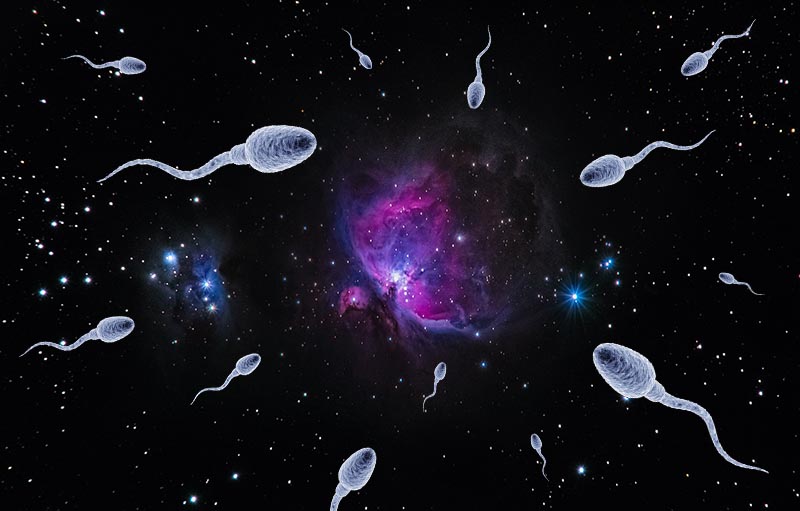Sending Frozen Sperm Into Outer Space
If humans start forming colonies on other planets, we’ll need a viable way to procreate — and a back-up method if getting it on the old-fashioned way doesn’t work.
By Jessie Schiewe
Traveling through outer space takes a toll on the human body. It can make you shorter and increase your likelihood of developing cancer. Atrophying muscles and blood volume loss are real risks, and viruses like herpes, chickenpox, and shingles are also likely to reactivate when you’re up there.
But though scientists have extensively studied the effects of space travel on our cardiovascular, muscular-skeletal, and central nervous systems, not much is known about the effects of microgravity on sperm and eggs. And the little we do know is not comforting.
To start, having sex in space would be far more challenging than it is on Earth. In zero-gravity environments, rather than being absorbed internally, bodily fluids would float away and potentially even damage nearby electronics.
Currently, space suits are not designed for having intercourse, and even if they were, they might not be of much use.
Getting a boner in space is incredibly difficult, Live Science reports, because the microgravity conditions decrease blood pressure making it hard for a penis to become fully erect.
Radiation is also a concern when considering procreating in space. On Earth, our atmosphere works as a buffer, protecting us from the galactic cosmic rays that can damage our bodies on a cellular level. We lose that shield in space, and the radiation we absorb could easily compromise the quality and viability of fresh sperm contained within the body.
If a female somehow, someway were able to get pregnant while in space — an experiment that has yet to be attempted, or achieved, by actual humans — the fetus could develop genetic abnormalities, birth defects, and other unforeseen handicaps because of the compromised sperm and egg from which it was created.
If, despite this, it continued developing long enough to be born, going through labor in zero-gravity would be incredibly challenging, painful, and very, very messy.
It is not yet known how growing up in space could affect a child, but it’s likely to pose more than a few challenges.
For instance, according to Live Science, some studies on newborn animals exposed to radiation have found that the harmful rays make them sterile. So even if a couple were to succeed in getting pregnant and birthing a child in space, that kid might not be able to have offspring of its own when the time comes.
Creating the technology to send people to space safely and successfully is one thing, but what’s the point if humans can’t even produce a viable colony once they’re up there?
Fortunately, there’s hope.
In a recent study conducted by researchers from Barcelona, Spain, scientists discovered that if you send frozen sperm into space, it will remain practically unchanged despite the different gravitational conditions.
Frozen sperm is already commonly used on Earth. It’s how sperm banks preserve their wares for future use, and it can make procedures like in vitro fertilization less rushed and time-sensitive. What’s more, frozen sperm can last indefinitely. It has no expiration date and when it’s time to be used, all you need to do is let it thaw out.
It is because of these unique qualities that Dr Montserrat Boada from Dexeus Women's Health and her team decided to study the effects of frozen sperm in space.
Granted, the specimens weren’t actually sent into space, but they were put in conditions similar to what they’d experience on a spaceship.
Dr. Boada’s small, preliminary study replicated the microgravity environment of space using a small aerobatic plane capable of executing parabolic maneuvers, or moments of weightlessness.
Each frozen sperm sample was subjected to eight seconds of microgravity and then analyzed back down on Earth for concentration, motility, vitality, morphology, and DNA fragmentation, CNN reports.
Compared to the control sperm that remained on Earth, the frozen sperm showed almost no difference despite being exposed to microgravity. Its DNA fragmentation rate was identical, and its concentration and motility was only slightly changed.
Given the results, Dr. Boada now plans to replicate the study on a larger scale using greater amounts of frozen sperm, as well as exposing them to longer periods of microgravity. Eventually, she and her team plan to test the conditions on fresh sperm, too.
Though humans still have a lot to figure out in the ways of procreating in space, the results of the frozen sperm space study are encouraging. At the very least, we now know that the idea of setting up a sperm bank outside of Earth is not that crazy. In fact, it might help solve some of the problems scientists are still grappling with today.
“It's not unreasonable to start thinking about the possibility of reproduction beyond the Earth,” Dr. Boada said. “We do need to know.”







